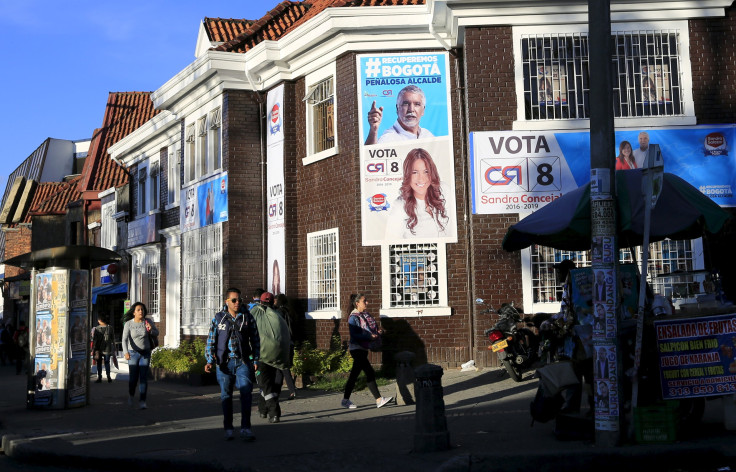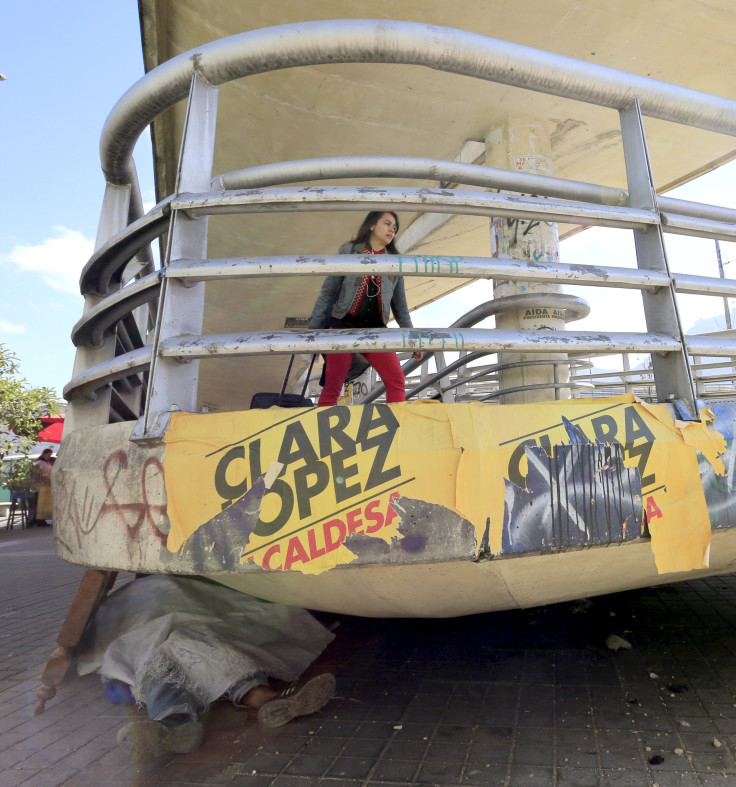Ahead Of Bogota Mayor Election, Corruption, Security, Transit Are Top Concerns As Candidates Vie For Colombia's Second-Highest Political Post

The mayoral election for the Colombian capital of Bogota is expected to be decided Sunday in a contest to lead the city that has historically been mired in corruption. The four top-polling candidates will be vying for the second-highest political post in the South American country as local elections are scheduled to be held throughout the rest of the nation.
The winner of Bogota's election will replace embattled mayor Gustavo Petro, who was temporarily forced out of office -- and later reinstated -- in 2014 after Colombia's inspector general determined he broke the law when he transferred garbage services out from private companies to a city-run service. Independent candidate Enrique Peñalosa, who served as Bogota's mayor between 1998 and 2001, but lost his 2007 and 2011 campaigns for the same post, was leading the polls with 32.4 percent of the vote. Peñalosa was running on the Equipo por Bogotá ticket.
He was followed by the next highest-polling candidate, Rafael Pardo, the Partido Liberal candidate with 23.1 percent support. Following them were Clara López at 19.3 percent, and Francisco Santos at 9.5 percent.
The weeks leading up to the Oct. 25 election have been wrought with violence throughout Colombia's towns and cities. Watchdog groups have reported mass instances of vote-buying or voter fraud, Time reported. Electoral officials have complained of candidates being linked to gangs and criminal enterprises, and reported hundreds of instances of candidates bussing in out-of-towners to cast illegal ballots. Killings have also been common on the campaign trail in the country, according to the Bogota-based watchdog group Electoral Observation Mission, Reuters reported.
“You don’t vote for the best person… You vote for whoever gives you groceries, construction materials or a little bit of money,” said Andres Ceballos, who works for the Electoral Observation Mission. “Unfortunately that’s been the logic here."

Leftists have been increasingly lending their support to López, teleSUR reported. The Harvard-educated Polo Democrático candidate served as the city's acting mayor for six months in 2011, after then-mayor Samuel Moreno Rojas was forced out of office for his involvement in a corruption scandal. Santos, considered a long shot, has been running on a mostly security-focused platform as the conservative Centro Democrático candidate.
The top election issue for 82 percent of Bogota voters is security, according to an Ipsos survey. Candidates have been advocating for a greater crackdown on street crime and violence, and pushing for heightened law enforcement and more prosecution.
While Peñalosa has planned to assist vulnerable youth by constructing more community centers and bolstering the existing police force, Pardo has said he will create an "urban guard" of 5,000 officers to assist police and focus on minor infractions. López has taken a preventative approach and said he wants to aid public programs in the education, employment and recreation fields. Santos has proposed adding 10,000 police officers and bring in a 6,000-officer civil police force, something officials have decided to move ahead with, according to the Prensa Latina news agency.
Other contentious elections issues include how best to organize the city's transportation and construct the first line of the metro, a proposed rapid transit line. But above all else, the issue of widespread corruption -- a scourge that that has left previous mayors embroiled in scandals and ousted from office -- remained the top campaign concern among candidates and voters alike, though the whomever remains victorious was unlikely to resolve the problem.
“The sad truth is that the big winner in these elections will not be peace and reconciliation but rather gutter politics that reward the most ignoble and despicable acts,” a local columnist wrote in the Bogota news outlet Semana, Time reported.
© Copyright IBTimes 2024. All rights reserved.











